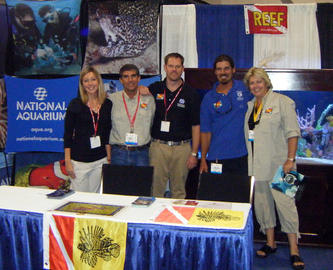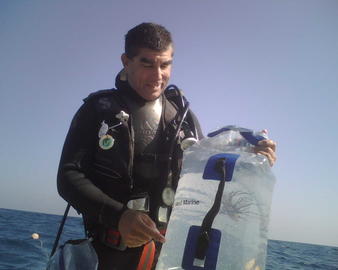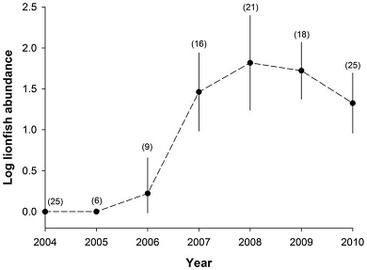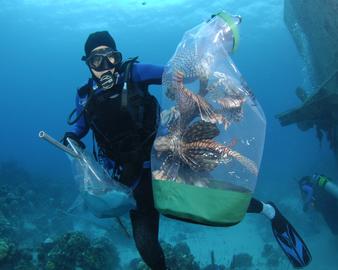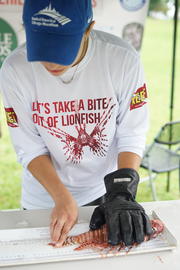Earlier this month, the Dive Equipment and Marketing Association (DEMA) held its once a year industry-wide, international trade show in Las Vegas. As part of the show, which attracts over 10,000 industry professionals and businesses, DEMA recognized the importance of the recent lionfish invasion into the Atlantic and asked REEF to present four show-sponsored talks for attendees and members.
The first confirmed lionfish sighting in the Florida Keys occurred on Tuesday, January 6, 2009. REEF received this specific sighting report at 2:30pm on the 6th from one of our volunteer divers from South Carolina, who was diving on vacation in the Keys. She found the fish near the base of Benwood Ledge (66') just offshore of the Benwood wreck, Key Largo. Via the numerous REEF media alerts and notices, she knew the invasion of lionfish was an issue and grabbed a few images with her digital camera to confirm the sighting.
While we all knew it was just a matter of time, the call still came with a bit of surprise and dread as the first confirmed lionfish sighting in the Florida Keys came in on January 6th, 2009. REEF member Becky Fowler, from Greenville, SC, was diving just offshore of the Benwood Wreck in Key Largo when she spotted the invasive lionfish near the base of a ledge at 66'. With all of the recent focus and outreach efforts that REEF has been forwarding to our members, she knew immediately that she needed to document the sighting and gather a detailed description of its location.
The Indo-Pacific lionfish invasion front is rapidly moving south into the Caribbean. Through REEF’s on-the-ground work, lionfish impacts are being documented in the Bahamas and initial results suggest these impacts will be devastating. Belize saw their first lionfish in 2008, and they are spreading fast. Divers are starting to see more fish on more sites. Now, Belizean organizations are offering a $50.00 per fish bounty to remove the fish before they become established.
There is growing concern that lionfish will affect the structure and function of invaded marine ecosystems. REEF Director of Special Projects, Lad Akins, is a co-author on a recently published paper evaluating these effects. The study was published in the scientific journal, PLoS ONE. Lead author, Stephanie Green, from Simon Fraser University (SFU), along with Akins and other co-authors Aleks Maljković (SFU), and Isabelle Côté (SFU), documented a dramatic 65% decline in 42 species of reef fish eaten by lionfish over a two year period.
There is growing concern that lionfish will affect the structure and function of invaded marine ecosystems. Lead author, Stephanie Green, from Simon Fraser University (SFU), along with REEF Director of Special Projects, Lad Akins and other co-authors Aleks Maljković (SFU), and Isabelle Côté (SFU), documented a dramatic 65% decline in 42 species of reef fish eaten by lionfish over a two year period.
REEF staff co-authored a new publication in the scientific journal PeerJ that features research findings from our Invasive Lionfish Research Program. The paper, titled "Setting the record straight on invasive lionfish control: Culling works", evaluates the effectiveness of lionfish removal efforts. Frequent culling of the invasive Indo-Pacific Lionfish throughout the Caribbean has been shown to cause a shift towards more wary and reclusive behavior by lionfish, which has prompted calls for halting culls.
Culling can be an effective management tool for reducing populations of invasive species to levels that minimize ecological effects. However, culling is labour-intensive, costly, and may have unintended ecological consequences. In the Caribbean, culling is widely used to control invasive Indo-Pacific lionfish, Pterois volitans and P. miles, but the effectiveness of infrequent culling in terms of reducing lionfish abundance and halting native prey decline is unclear.
Last month, REEF kicked off our 2018 Lionfish Derby series at the Phillip and Patricia Frost Museum of Science in Miami. Four teams competed on June 9 and 10 to bring in a total of 309 fish. The largest lionfish caught was 411mm (just over 16 inches) and the smallest was 112mm (about 4.5 inches.) We have two more derbies coming up this month - in Sarasota at Mote Marine Lab and Aquarium on July 6 - 8, and in Ft. Lauderdale at 15th St. Fisheries on July 13 - 14, and a few more later this summer and fall.

